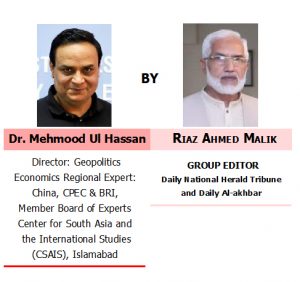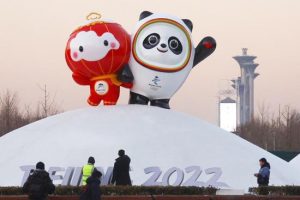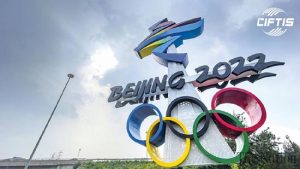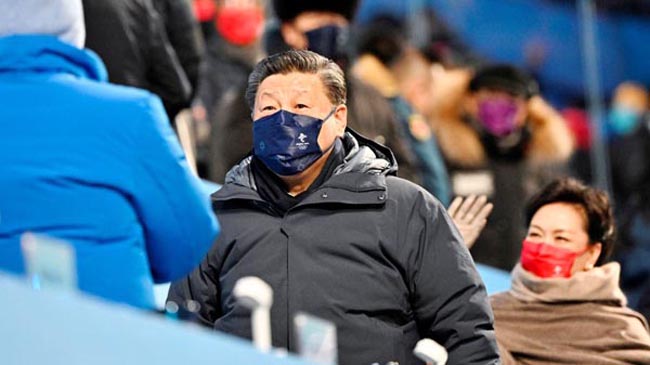 Sporting spirits of Chinese nation and its visionary leadership won by inaugurating the Beijing Winter Olympics 2022 and secret schemes of the west were dumped under the snow. Chinese President Xi Jinping attended the opening ceremony of the Beijing Winter Olympics (BWO) and declared the games open at the National Stadium yesterday. The closing ceremony will take place on February 20.
Sporting spirits of Chinese nation and its visionary leadership won by inaugurating the Beijing Winter Olympics 2022 and secret schemes of the west were dumped under the snow. Chinese President Xi Jinping attended the opening ceremony of the Beijing Winter Olympics (BWO) and declared the games open at the National Stadium yesterday. The closing ceremony will take place on February 20.
In this way for all the talk of a diplomatic boycott, Chinese leader Xi Jinping has managed to attract a globe-spanning roster of presidents, royals and other dignitaries to the opening ceremony of the Winter Olympics. Beijing becomes the first city to host both the summer and Winter Games. Beijing’s National Stadium also known as the Bird’s Nest hosted the event.
Previously, Global forces against pure sports, human simplicity, soft power orientations and last but not least, successful sports diplomacy unfortunately once again raised doubts about Beijing Winter Olympics 2022 urging all countries to boycott but all proved ineffective against strong resolve of China and Beijing Winter Olympics has been kicked off. Together for a Shared Future” is the official motto of the Olympic and Paralympic Winter Games Beijing 2022 which highlights the power of the games to overcome global challenges as a community, with a shared future for humankind.
Despite exaggerated hue and cry of the west China maintained zero COVID strategy and staged the splendid opening ceremony and games in Beijing. Interestingly, Qi Fabao, the regimental commander of the People’s Liberation Army (PLA), who was injured during the June 2020 border skirmish with Indian soldiers in the Galwan Valley in eastern Ladakh, as a torchbearer for the Games Torch Relay.
Some 60,000 people, including athletes, coaches, officials, federation delegates, volunteers and media personnel attended the event. The events are taking place within the “closed loop” that will allow them to move between accommodation and venues on official transport. They are not allowed to move freely in public.
Prime Minister Imran Khan, Russian President Putin, Kazakhstan president Tokayev and Uzbekistan President Shavkat Mirziyoyev also were among the prominent political figures to attend the opening ceremony and showed solidarity with China and its sports diplomacy. It was indeed moral victory of China and its policy makers over exaggerated hue and cry of the West mass media about so-called wild spread of virus in China and exploitation of natural resources for BWO.
As propagated by the western mass media, it was also political and diplomatic success of China and its visionary leader Xi who succeeded to hold BWO despite boycott of various countries including the US, Canada, UK etc. It was not just a political symbolism but real victory of Chinese public diplomacy in which sports always play a decisive role. Interestingly, Saudi Arabia has made its debut in the winter Olympics.
Hopefully the Beijing Winter Olympics 2022 will promote the building of a community with a shared future for mankind. It will translate Chinese ancient philosophy of pursuit of purity into reality and will inspire the Chinese people and helps to create a harmonious world. It will also showcase Chinese President Xi Jiping holistic policy of shared prosperity and common civilizations which are enriched by exchanges and mutual learning. Because China no longer needs to prove its standing on the world stage; instead, it wants to proclaim the sweeping vision of a more prosperous, more confident nation under Mr. Xi. President Xi hoped that Beijing 2022 would further enhance Chinese confidence in realizing the great rejuvenation of the Chinese nation. It will also “show a good image of China and demonstrate Chinese nation’s commitment to building a community with a shared future for mankind.
President Xi delivered a video address to the opening ceremony of the 139th International Olympic Committee (IOC) Session, extending a warm welcome to IOC President Thomas Bach and other IOC members who have gathered in Beijing, the first city in the world to host both the summer and winter Olympic Games.
While addressing the opening ceremony President Xi termed pandemic as a new period of turbulence and transformation with multiple challenges.
He thanked the IOC for its active contribution to the development of sport in China over the past years and for its strong support and guidance for China’s bid and preparations for the 2022 Beijing Winter Olympic Games.
g Alpine skiing
g Biathlon
g Bobsleigh
g Cross-country skiing
g Curling
g Figure skating
g Freestyle skiing
g Ice hockey
g Luge
g Nordic combined
g Short track speed skating
g Skeleton
g Ski jumping
g Snowboard
g Speed skating
President Xi showcased tremendous socio-economic development of China by saying that from “One World, One Dream” in 2008 to “Together for a Shared Future” in 2022, China has taken an active part in the Olympic Movement and consistently championed the Olympic spirit. China is committed to pursuing the Olympic ideal with concrete actions. President Xi promised to deliver to the world “a streamlined, safe and splendid” Games, while trying to realize “Faster, Higher, Stronger Together”.
The Beijing Winter Olympic Games (BWOGs) was held at a special time, as the world faces numerous interlinked changes and challenges because of deadly pandemic in the world. However, the theme of the BWOGs, “Together for a Shared Future” vividly reflects that China has firm belief in universal cooperation, togetherness, shared prosperity, community development, equal & equitable world, dialogue, diplomacy and engagement which have further demonstrated its holistic spirits towards humanity, peace and harmony.
Chinese athletes like the first Chinese Winter Olympic Games medal winner Ye Qiaobo, first Chinese Winter Olympic Games gold winner Yang Yang, and Wang Meng, the Chinese speed skater who won three gold medals in 2010 in Vancouver, also participated in the opening ceremony and are among the leading candidates.
Interestingly, a new and innovative method was used to ignite the cauldron that “has not appeared in the more than 100-year history of the modern Olympic Games. It clearly reflected the concept of low carbon environmental protection. The idea was supported by the Organizing Committee of the 2022 Winter Olympic Games and the IOC.
In contrast to the four-hour-long ceremony with 15,000 performers used in the 2008, the opening ceremony for the 2022 Winter Olympics was relied on high technology instead of the previous “huge crowd” strategy, and was last less than 100 minutes and feature about 3,000 performers.
Interestingly, the BWOGs had achieved 98 percent of its sustainable development commitments as of September 30, 2021, with carbon emissions during the Games set to be fully neutralized, debunking the Western media’s stepped-up hype over the environmental costs of the event and the alleged difficulty in verifying commitments.
The BWOGs not only carries special weight in showcasing China’s green pledges, as international society has prioritized carbon peaking and neutrality as development goals, but would lead to greener sports events.
According to the report, titled “Sustainable Development (Pre-competition),” China has delivered significant results on its sustainable development commitment, including all stadiums reaching green architecture standards, and the average PM2.5 concentration in Beijing in 2022 will be 45 percent lower than in 2012.
The report, outlined China’s sustainable commitments, its plans are being carried out, and the latest developments in areas including ecological protection, regional development and social progress.
its plans are being carried out, and the latest developments in areas including ecological protection, regional development and social progress.
The BWO has strictly carried out low-carbon management. The four ice stadiums for the Games are using new types of carbon dioxide refrigerants, and all stadiums will run entirely on green electricity. It is estimated that 400 million kilowatt-hours of green electricity will be consumed across Olympic venues in Beijing. That is equivalent to cutting burning 128,000 tons of standard coal and reducing emissions of 320,000 tons of carbon dioxide.
China also rolls out a low-carbon transportation system, under which energy-efficient and clean-energy vehicles account for more than 80 percent of the vehicles used during the Games.
Using carbon dioxide to make ice for the entire process, it produces almost zero carbon emissions, and improves energy efficiency by more than 20 percent compared with conventional ice-making systems, the Global Times previously learned from the venue staffer.
It seems that Beijing has organized and coordinated the whole process to guarantee a timely delivery of its green goals, a model that could serve as a benchmark for other hosts of sports galas in the post-Olympic era.
It has a long-term strategic sustainable plan that detailed 119 measures on three fronts: a positive impact on the environment, new regional development, and making life better.
While some Western critics cast doubt over a system for artificial snow, which they touted as a waste of water resources, officials stressed that all international games use man-made snow to ensure snow quality, and the actual use of water for generating snow is limited.
Contrarily, the water consumption for making snow represents 1.6 percent of local water consumption in Yanqing district, and in Zhangjiakou’s Chongli district, the ratio is 9.8 percent,” and such consumption would not affect regional water safety or the environment.
To conclude, Beijing Winter Olympics has generated 600,000 new jobs in Beijing, Tianjin and Hebei region in sports, culture and tourism sectors. Stocks of digital Yuan, hydrogen energy, 5G, ice and snow industry, and other associated subsectors have been favoured by the capital markets. It would further enhance Beijing GDP up to 5 percent till 2025. It would further promote footwear and ice sport and clothing up to 598.9 billion yuan till 2025 and along with 15 billion yuna in ski equipment in 2022.
The Chinese government invested $1.51 billion in hardware equipment, food & beverage and other areas. About 3000 hydrogen fuelled buses have been deployed in the competition zones which will reduce 35400 tons of CO2 which is a significant achievement. Moreover, in the first time in the history of Olympics it has been completely fuelled with green energy and total Artificial Intelligence operated in all zones.
Definitely, it has successfully showcased Chinese President Xi Jiping holistic policy of shared prosperity and common civilizations which are enriched by exchanges and mutual learning.
In this connection, The Beijing Winter Olympic has proved conducive to advancing both China’s sports, social and economic development as well as the development of World Olympic Movement, facilitating mutual exchanges between Chinese civilization and other civilizations and once again offering Chinese people an opportunity to contribute to Olympic Movement an d the dissemination of Olympic spirit.
d the dissemination of Olympic spirit.
It seems that Beijing Winter Olympics has promoted the popularization and development of ice and snow sports, to encourage in-depth international exchanges and cooperation, and contribute to sustainable development and the promotion of Olympic legacies.
China adopts a green, inclusive, open and clean approach to hosting the Olympic and Paralympic Winter Games, in alignment with China’s efforts to jointly build the Belt and Road and push forward ecological protection.
Hopefully, Beijing Winter Olympics 2022 will support the concept of ecological priority, resources conservation, and environmental friendliness. It seems that Green Beijing Winter Olympics 2022 has won war race against false, fake and fictional propaganda of the west about so-called genocides and human rights.





